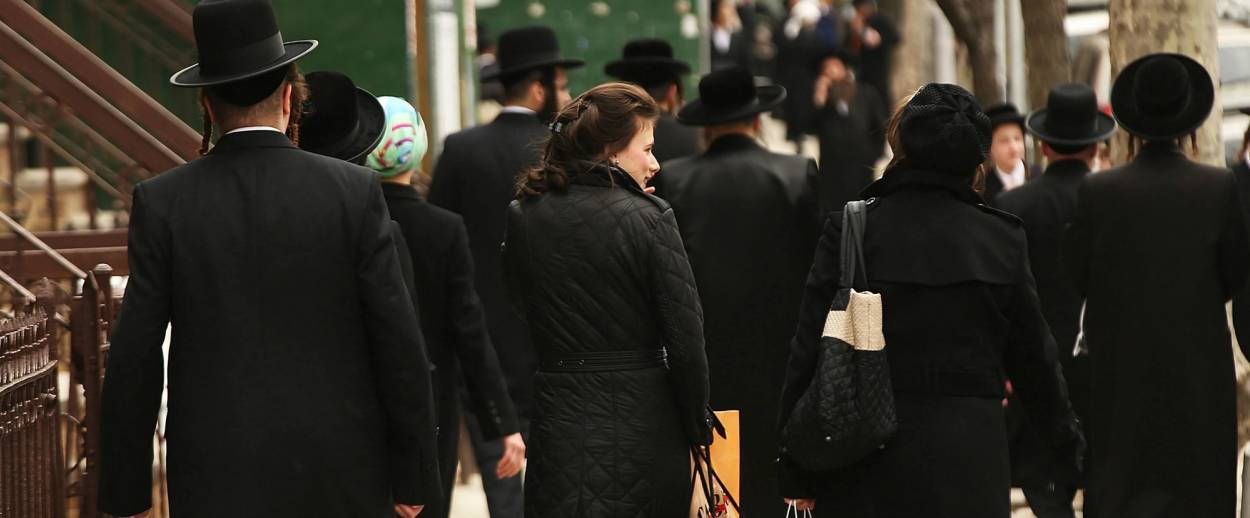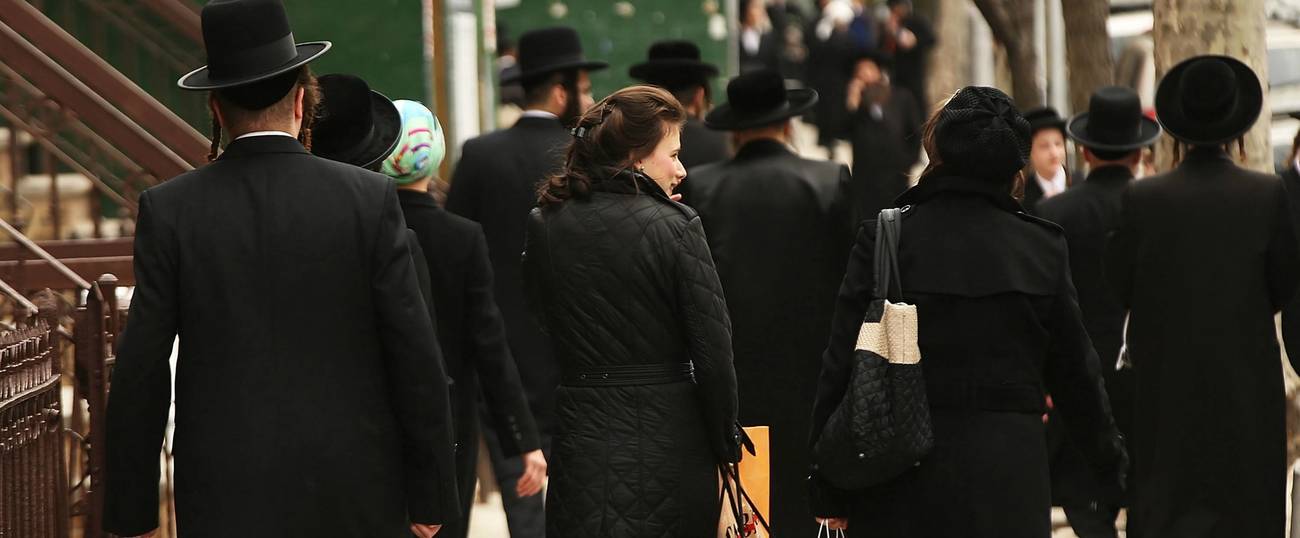No, Rabbi, Orthodox Women Are Not Safer
A response to Rabbi Avi Shafran’s claims that Jewish law protects Orthodox women from sexual abuse




The following is a response to Rabbi Avi Shafran’s article from last week, “A Safer Space for Women in Orthodox Judaism’s Rules for Sex.”
Dear Rabbi Shafran,
Allow me to introduce myself. I am a woman. I am Orthodox. I went through the Bais Yakkov system. I am a mother of three young girls who are also being raised Orthodox and attending Yeshiva day schools. I have never been seriously physically assaulted, and I am thankful every day for that. I also think daily, of the possibility of physical assault–I think about that vulnerability in both secular and religious settings alike. I have, however, been too many times verbally assaulted and made an object for a man to remark on; demeaned and degraded because of my sex. Many of these instances took place in frum environments, by observant males. This is why I was outraged by the outlandish claims made in your recent article where you attempted to prove that gender halachot protects orthodox women from sexual assault and harassment, and, instead, only further confirmed that “#metoo” is very much a relevant and integral discussion within the Orthodox community. Because if religious male leaders can write an essay such as yours, and have a forum to publish it, and an audience who will regard it as valuable spiritual insight, well then, my daughters and I, and every Orthodox woman I know are in big trouble.
Yes, we have halachot and Jewish religious observances in place to guide us in sexual activity and healthy, respectful interactions between members of the opposite sex. But to claim that these halachot actually guard women from assault, to claim that we are less assaulted than secular women, is to silence Orthodox women, to perpetuate abuse and to hide and shelter Orthodox abusers. In your article you claim that: “… sexual abuse happens in the Orthodox community … but is relatively rare …” but that is a baseless and dangerous statement. Do you have statistics to support that? I suspect you don’t, and I bet even if you did they would be skewed because chas v’shalom (G-d forbid) we ever out an Orthodox abuser. The halachik ramifications of mesira (reporting a fellow Jew to secular authorities), chillul Hashem (embarrassing Jews) and lashon hara (gossip) are constantly put before the safety of our community’s victims, thus sustaining the shameful practice of the Orthodox to protect abusive men over vulnerable women and children.
A 2007 study done in The American Journal of Psychiatryreported that 26 percent of its Orthodox female study participants experienced sexual abuse within the community and that more ultra-Orthodox women reported abuse than modern Orthodox women. These are dizzying statistics, surely not “a rare occurrence” as your essay claims. My head swims with the women I know personally and anonymously who have suffered physically at the hands of men; men in our community; rabbis, teachers, neighbors, family, friends. According to the National Sexual Violence Resource Center, 51.1 percent of female victims are raped by an intimate partner or acquaintance, which would mean it is our men raping and assaulting our women. (And we aren’t even touching on the agunah problem–a halachah that is manipulated by too many men drunk on the abuse of power over women.) When women have been brave enough to voice their abuse, they are bullied, silenced and threatened again by our male leaders, rabbis who dismiss abuse, rabbis who protect abusers or shuffle them from community to community creating new victims. There is a reason why our community has few statistics on rape and sexual assault—it is because our community bullies the victims into fearful silence. In 2018, a study was conducted by Orthodox researchers, Dr. Rosmarin and Dr. Pelcovitz, which was published in The Child Abuse and Neglect Journal, stating that those who left the Orthodox community are more than four times as likely to have been molested as children than the general population. According to the study, those victims that left our community were more likely to have reported the abuse than those who remained. The obvious conclusion is that our community members are afraid to speak out. A reluctance to report sexual abuse cannot and should not be confused with a lack of abuse. Orthodox women who are observing the very laws, which you claim protect them, are assaulted by their own husbands and are suffering silently rather than take the risk of speaking with their rabbis. They suffer in fear because the Orthodox community has long sustained an archaic belief that we are not susceptible to the same abuse as the secular community—and it is articles like yours that sustain this belief. But let me tell you, as an Orthodox woman, I feel threatened by your beliefs and claims.
There is a reason that organizations such as SOVRI (Support for Orthodox Victims of Rape and Incest), and Jewish Community Watch exist—because abuse is as rampant in our community as it is in any other. And we need more organizations and leaders to speak out against sexual abuse, not leaders who pretend we don’t have a real and terrifying problem. We need to eradicate this harmful way of thinking—that halacha trumps the well-being of living women and children. We cannot hide behind a false illusion of safety built on the shaky foundation that Torah observers are not susceptible to perpetrating evil.
I beg of you to reconsider your thoughts on the sexual safety of women in our community. I for one resent my voice of safety and sexual integrity being publicly represented by a male Orthodox rabbi who appears to have no experience with sexual assault victims or mentality and offered no statistical or supportive research for his claims. You wrote that we can’t expect men to respect female performers who dress a certain way—this is victim blaming and harmful misogynistic thinking. It is delusional to believe that the halachot of modesty and yichud can combat abuse and you would know that if you would just ask us—we frum women can tell you. In fact, leave it to us, allow us to speak out on whether or not we feel these halachot have any power to protect us, because you do not represent me. And I want you and everyone else to know that. That you do not represent the female voice of Orthodox women.
You say #metoo should serve a higher purpose than just shaming the guilty but you are missing the entire female stance on abuse if you think all we are trying to accomplish is shame. We are trying to protect ourselves and eradicate sexual abuse and harassment and the harmful kind of rhetoric such as yours that encourages blindness to abuse in our frum communities. I kindly request that you allow us the dignity and right to do that.
Respectfully,
Talya
Talya Jankovits’ work has appeared in Bartleby Snopes, Kveller, The Jewish Literary Journal, Mutha Magazine, Bleed; A Literary Blog, and The Citron Review among others. Her short story “Undone” in Lunch Ticket was nominated for the 2013 Pushcart prize. She holds her MFA in Creative Writing from Antioch University.